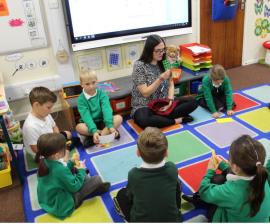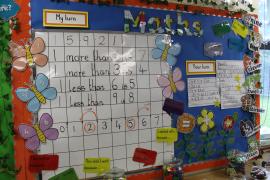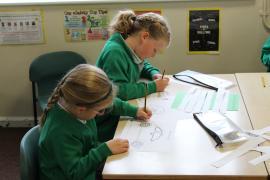Intent
Meadowside Primary strives to provide all of its pupils with the opportunity to grow into knowledgeable, robust and resilient learners. Our Mathematics curriculum is key to this overarching school aim. We follow a mastery approach, with the belief that everyone can achieve. A strong emphasis is placed on problem solving and discussion within the teaching and learning to help make mathematics engaging and interesting.
Mathematics teaches children how to make sense of the world around them through developing their ability to calculate, reason and solve problems. It is essential to everyday life, critical to science, technology and engineering, and necessary for financial literacy and most forms of employment. A high-quality mathematics education therefore provides a foundation for understanding the world, the ability to reason mathematically, an appreciation of the beauty and power of mathematics and a sense of enjoyment and curiosity about the subject.
At Meadowside Primary School our aim is that every child will develop a love of maths and will be supported in their learning through quality first teaching and clear, well planned progression across all aspects of the mathematics curriculum.
Implementation
EYFS Mathematics
Our EYFS curriculum provides our youngest pupils with the opportunity to develop a deep and secure understanding of the six key areas of early mathematics learning:
- Cardinality and Counting – understanding that the cardinal value of a number refers to a quantity
- Comparison – understanding that comparing numbers involves knowing which numbers are worth more or less than each other
- Composition – understanding that one number can be made up from two or more smaller numbers
- Pattern – looking for and finding patterns to support noticing and understanding mathematical relationships
- Shape and Space – understanding what happens when shapes move or combine with other shapes to help develop wider mathematical thinking
- Measures – comparing different aspects such as length, weight and volume to support later work using units to compare
Each week, there will be a maths specific lesson based around a ‘big question’. The learning is chunked to be a mixture of whole class interactive discussion and paired and individual practical using manipulatives. Pictorial recording is introduced in the summer term if appropriate. A class maths journal is used to capture the learning through a mixture of photos and adult recording to summarise the learning. The journal is referred to in subsequent lessons to support retrieval and linked learning and is available during continuous provision for children to independently access.
A maths in ten session will take place daily with a focus on a small step in the week’s mathematical learning eg: tens frame, part- whole, songs, manipulatives. This is made accessible for all learners through questioning and support.
KS1 and KS2
Pupils have daily maths lessons which include fluency, problem solving and mathematical reasoning. All teaching follows the White Rose calculation policy ensuring children have a consistent and effective approach to calculating.
Lessons are structured to include retrieval of previous knowledge, fluency, problem solving and reasoning. Children are encouraged to talk mathematically, work collaboratively and regularly reflect on their learning.
Core number skills are taught through the use of Numbots and TT Rockstars to encourage children’s engagement and regular practice of these. With a strong recall of core number facts children’s confidence grows and working memory is freed up leading to greater achievement.
Mathematics Mastery Approach
The teaching of mathematics is supported by the use of White Rose Maths and supplemented by resources from a number of other places such as NCETM. Pupils are given the opportunity to deepen their learning and allow for their prior knowledge and skills to be transferred to different contexts. Learning can be extended through the use of digging deeper questions and challenges.
Key features of our Mathematics Mastery curriculum:
- High expectations for every child
- Enjoyment and enthusiasm for learning
- A focus on developing fluency in mathematics
- Prioritisation of number sense and place value
- An ability to use and apply mathematics across the curriculum and in real life
- A practical approach – concrete resources, pictorial representation before moving to the abstract
- Problem solving and reasoning
- Calculating with confidence by understanding the structure behind the method
Impact
Our intended impact is to meet the aims and rationale set out in our initial intention. We will measure the impact of our implementation against our intention through regular scheduled pupil book studies, formative and summative assessment as well as pupil/parent/teacher voice. Subject leaders and SLT will perform pupil progress meetings to analyse and discuss pupil’s learning, progress and attainment against National Curriculum age related expectations.
To support our children in building a strong recall of core number facts, we subscribe to Numbots and TT Rockstars. Having a secure recall of number facts ensures that children become confident mathematicians, able to apply their learning to a range of different contexts.



